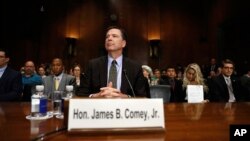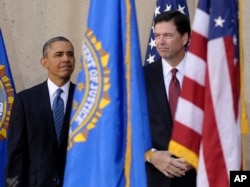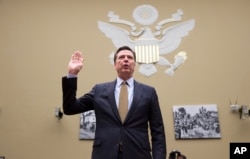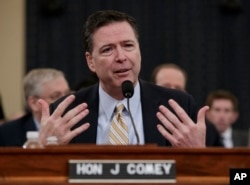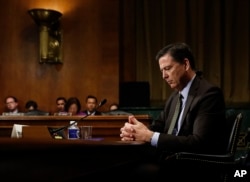James Comey's appearance Thursday before the Senate intelligence committee, during which he's expected to describe his encounters with President Donald Trump in the weeks before he was fired as FBI director, is one of the most anticipated congressional hearings in years.
Trump has derisively characterized Comey as a "showboat." While that's hardly a label with which his supporters would agree, there's no question Comey has shown a flare for drama during other testimony.
A look at some other riveting moments:
May 15, 2007
"This was a very memorable period in my life; probably the most difficult time in my entire professional life. And that night was probably the most difficult night of my professional life. So it's not something I'd forget."
So began Comey's extraordinary recounting of a tense clash with fellow Bush administration officials in the hospital room of the ailing attorney general, John Ashcroft, three years earlier.
His narrative of having faced down senior White House officials, and of having drafted his own resignation letter as deputy attorney general, helped cement a reputation for political independence and moral certitude that President Barack Obama cited in 2013 when he nominated Comey for the FBI director job.
The confrontation came over the renewal of a domestic surveillance program whose legality Comey had strenuously questioned. Upon learning the White House counsel and chief of staff were looking to get approval from the barely conscious Ashcroft, Comey had his security detail redirect him to the hospital so he could intercept them.
Speaking to a rapt congressional audience, he described how he ran up the stairs to Ashcroft's darkened hospital room, positioned himself in an armchair next to the disoriented attorney general and waited for the White House officials, Alberto Gonzales and Andrew Card, to arrive. He had already taken steps to ensure that FBI agents who were present would not remove him from the room under any circumstances.
Ashcroft, who during his illness had conveyed the powers of his position to Comey, lifted his head off the pillow and expressed his own misgivings about the surveillance program. Then, according to Comey, he added: "But that doesn't matter, because I'm not the attorney general."
Comey was, at least for the moment. And his objections mattered.
July 7, 2016
Days after announcing in unusually public fashion the FBI's decision not to recommend charges in the Hillary Clinton email investigation, Comey faced nearly five hours of often-contentious questioning about how he had reached his conclusion.
"People can disagree, can agree, but they will at least understand that the decision was made and the recommendation was made the way you would want it to be — by people who didn't give a hoot about politics, who cared about what are the facts, what is the law," Comey told the House oversight committee.
Comey revealed new details of the investigation, repeating his assertion that Clinton had been extremely careless in her handling of classified email but also suggesting she might not have fully grasped the classification marking system. He also parried Republican contentions that anyone else accused of mishandling classified information would have been prosecuted, saying it would have been "celebrity hunting" to charge Clinton under statutes that didn't fit the conduct.
Comey faced criticism for his detailed discussion of a case that ended without criminal charges. The unusual nature of his testimony was laid bare the following week when Attorney General Loretta Lynch declined to answer many of the same questions Comey received.
"I know that this is a frustrating exercise for you," she told lawmakers.
March 20, 2017
Though it had been reported the FBI was investigating potential collusion between Russia and the Trump campaign, this House intelligence committee hearing marked the first time Comey confirmed its existence.
It's unusual for the FBI to ever publicly disclose an investigation, much less one that affects the president, and there was significant uncertainty ahead of the hearing about whether Comey would break from protocol and acknowledge the probe was under way.
He did as soon as he began speaking, saying that though it was rare for the FBI to discuss an investigation involving classified information, there are "unusual circumstances" when it might be appropriate.
"This," he said to dramatic effect, "is one of those circumstances."
He continued: "I have been authorized by the Department of Justice to confirm that the FBI, as part of our counterintelligence mission, is investigating the Russian government's efforts to interfere in the 2016 presidential election," including potential coordination between the campaign and Moscow.
That bombshell announcement made clear to everyone, including the president who later fired him, that the investigation was very real.
May 3, 2017
Just six days before his firing, Comey strenuously defended his actions in the Clinton email case, including his decision to alert Congress just 11 days before the presidential election that the investigation was being revived because of newly discovered emails.
Comey told lawmakers that though it made him "mildly nauseous" to think his moves could have influenced the election, he would have made the same choices again.
To share information with Congress was "really bad." To withhold it from them would have been "catastrophic," he reasoned.
The appearance was also notable for misstatements Comey made, and that the FBI later corrected, about top Clinton aide Huma Abedin and her estranged husband, Anthony Weiner, on whose laptop the Clinton emails were found.
He could not have known then that the appearance before Congress would be his last as FBI director. But that didn't stop him from reflecting wistfully on his job in his opening statement, calling it the "honor of my life."
"I know you look at me like I'm crazy for saying this about this job. I love this work. I love this job."




